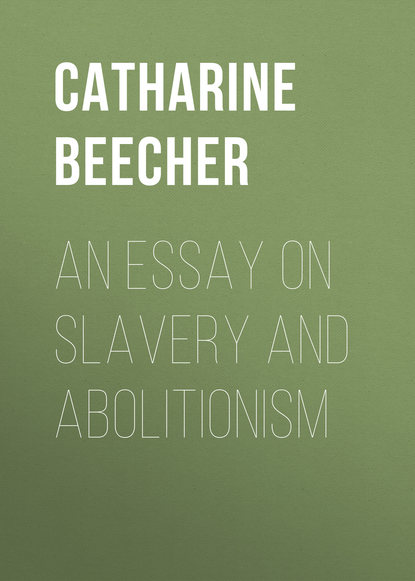 Полная версия
Полная версияПолная версия:
An Essay on Slavery and Abolitionism
Another indispensable requisite for the office of reprover is a character distinguished for humility and meekness. There is nothing more difficult than to approach men for the purpose of convincing them of their own deficiencies and faults; and whoever attempts it in a self-complacent and dictatorial spirit, always does more evil than good. However exemplary a man may be in the sight of men, there is abundant cause for the exercise of humility. For a man is to judge of himself, not by a comparison with other men, but as he stands before God, when compared with a perfect law, and in reference to all his peculiar opportunities and restraints. Who is there that in this comparison, cannot find cause for the deepest humiliation? Who can go from the presence of Infinite Purity after such an investigation, to "take his brother by the throat?" Who rather, should not go to a brother, who may have sinned, with the deepest sympathy and love, as one who, amid greater temptations and with fewer advantages, may be the least offender of the two? A man who goes with this spirit, has the best hope of doing good to those who may offend. And yet even this spirit will not always save a man from angry retort, vexatious insinuation, jealous suspicion, and the misconstruction of his motives. A reprover, therefore, if he would avoid a quarrel and do the good he aims to secure, must be possessed of that meekness which can receive evil for good, with patient benevolence. And a man is not fitted for the duties of a reprover, until he can bring his feelings under this control.
The last, and not the least important requisite for a reprover, is discretion. This is no where so much needed as in cases where the domestic relations are concerned, for here is the place above all others, where men are most sensitive and unreasonable. There are none who have more opportunities for learning this, than those who act as teachers, especially if they feel the responsibility of a Christian and a friend, in regard to the moral interests of pupils. A teacher who shares with parents the responsibilities of educating their children, whose efforts may all be rendered useless by parental influences at home; who feels an affectionate interest in both parent and child, is surely the one who might seem to have a right to seek, and a chance of success in seeking, some modifications of domestic influences. And yet teachers will probably testify, that it is a most discouraging task, and often as likely to result in jealous alienation and the loss of influence over both parent and child, as in any good. It is one of the greatest compliments that can be paid to the good sense and the good feeling of a parent to dare to attempt any such measure. This may show how much discretion, and tact, and delicacy, are needed by those who aim to rectify evils in the domestic relations of mankind.
The peculiar qualifications, then, which make it suitable for a man to be an Abolitionist are, an exemplary discharge of all the domestic duties; humility, meekness, delicacy, tact, and discretion, and these should especially be the distinctive traits of those who take the place of leaders in devising measures.
And in performing these difficult and self-denying duties, there are no men who need more carefully to study the character and imitate the example of the Redeemer of mankind. He, indeed, was the searcher of hearts, and those reproofs which were based on the perfect knowledge of "all that is in man," we may not imitate. But we may imitate him, where he with so much gentleness, patience, and pitying love, encountered the weakness, the rashness, the selfishness, the worldliness of men. When the young man came with such self-complacency to ask what more he could do, how kindly he was received, how gently convinced of his great deficiency! When fire would have been called from heaven by his angry followers, how forbearing the rebuke! When denied and forsaken with oaths and curses by one of his nearest friends, what was it but a look of pitying love that sent the disciple out so bitterly to weep? When, in his last extremity of sorrow, his friends all fell asleep, how gently he drew over them the mantle of love! Oh blessed Saviour, impart more of thy own spirit to those who profess to follow thee!
THE END1
History of the Abolition of the Slave Trade.
2
Coleridge.
3
The father of the late Samuel Whitbread, Esq., generously undertook, in order to make Mr. Clarkson's mind easy upon the subject, "to make good all injuries which any individuals might suffer from such persecution;" and he honourably and nobly fulfilled his engagement.
4
This account of Clarkson, and the preceding one of Wilberforce, are taken from the Christian Keepsake of 1836 and 1837.



